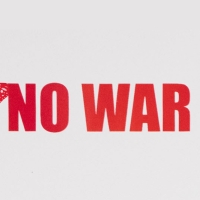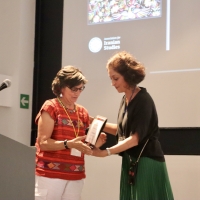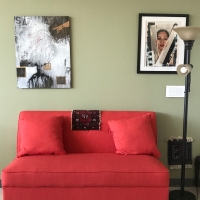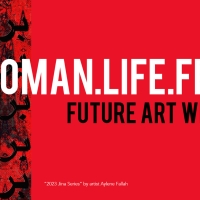Future Art Writers Award: A Writerly Exploration of Art as Protest in the Movement for Woman. Life. Freedom.
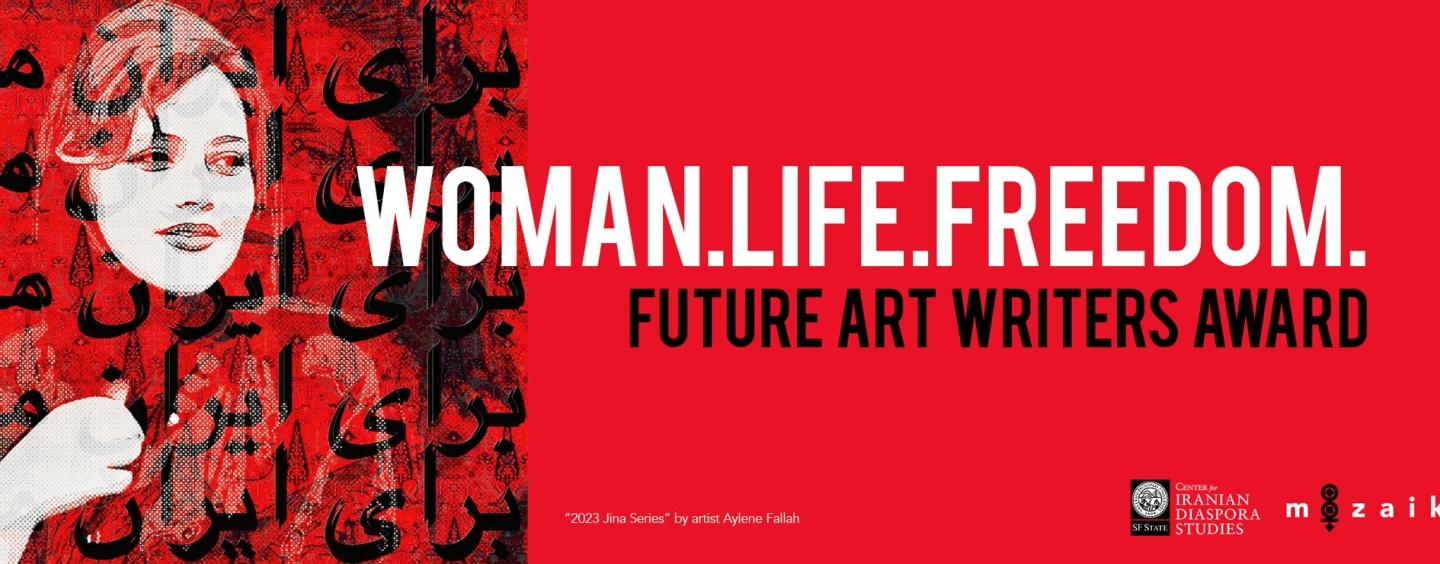
MOZAIK Philanthropy, in collaboration with the Center for Iranian Diaspora Studies at San Francisco State University, announced an open call for art writers in the Fall of 2023 to propose any style of written work that takes art as its focus in the struggle for freedom in Iran. Submissions came from art writers across the globe and were peer-reviewed by an independent jury of art writers, social movement scholars, and academics from educational institutions in the U.S. and internationally.
Today, we shine a light on the brilliant jury members of the 2024 Future Art Writers Award and thank them for their time, expertise and wisdom in reviewing literary works that center the power of art as activism, demanding freedom, life, and a change to Iran’s leadership.
*The award recipients of the 2024 Future Art Writers Award will be announced in mid-February along with details of the forthcoming 4th edition of the MOZAIK E-ZINE.
Meet the Jurors:
Dr. Persis Karim
San Francisco State University
Persis Karim is the Neda Nobari Chair of the newly-established Center for Iranian Diaspora Studies and a professor in the Comparative and World Literature department at SFSU. She received her Ph.D. in Comparative Literature and master’s degree in Middle Eastern Studies from the University of Texas at Austin. From 1999-2017, she was a professor in the Department of English and Comparative Literature at San Jose State University, where she taught courses in English, American literature, world literature, ethnic literature, creative writing, and Middle Eastern studies. She coordinated their Middle Eastern Studies minor program from 2010-2017 and was the founding director of their Persian Studies Program.
Prof. Karim is the editor/co-editor of three anthologies of Iranian diaspora literature: Tremors: New Fiction by Iranian American Writers (2013); Let Me Tell You Where I’ve Been: New Writing by Women of the Iranian Diaspora (2006), and A World Between: Poems, Short Stories and Essays by Iranian-Americans (1999). She has written numerous articles on modern Iranian literature and Iranian diaspora literature for journals such as Iranian Studies, Comparative Studies of South Asia, Africa, and the Middle East, and MELUS: Multi-Ethnic Literatures of the United States. She is also a published poet.
Dr. Shiva Balaghi
UC Santa Barbara
Dr. Shiva Balaghi is a cultural historian specializing in the visual culture of the Middle East and its diasporas. She is Academic Coordinator of the Area Global Initiative at the University of California, Santa Barbara. She previously served as Senior Advisor to the President of the American University in Cairo for Arts and Cultural Programs and taught History and History of Art at NYU and Brown University for nearly two decades. Balaghi has written widely on Iranian art, including essays for the Guggenheim, the Warhol Museum, the Hood Museum at Dartmouth, and the Fine Arts Museums of San Francisco. Her writing has also appeared in Artforum, Ibraaz, Hyperallergic, MERIP, and Iranian Studies. Her books include Picturing Iran: Art, Society and Revolution (co-edited), Parviz Tanavoli (co-edited), Reconstructing Gender in the Middle East (co-edited), and Saddam Hussein: A Biography. Balaghi has curated over a dozen art exhibitions in museums and galleries in the US, Europe, and the Middle East, most recently “A Boundless Drop to a Boundless Ocean” an exhibit of Iranian and Arab diaspora artists at the Orlando Museum of Art and the American University in Cairo in 2021.
Nooshin Hakim Javadi, MFA
University of Notre Dame
Nooshin Hakim Javadi is an artist-researcher and assistant professor at the University of Notre Dame, whose work is located at the crossroads of the material culture of conflict and racial geography. Her research articulates a commitment to bringing forth the obscured stories of conflict, struggle, and challenge, often manifested in the dynamic of Oil, Soil, and the politics surrounding mobility. She examines how the availability and control of oil and soil resources can impact the mobility of people and the development of social and political dynamics. She received her BFA in Sculpture from Tehran University and an MFA from the University of Minnesota in Visual Arts with a minor in Projection Design.
Javadi is the recipient of several national and international awards, including the Emerging Artist Jerome Fellowship and Target Studio for Creative Collaboration Fellow at the Weisman Art Museum.
Her interdisciplinary works and performances have been shown in the United States, Europe, and Iran, including the Museum fur Neue Kunst, Freiburg, Germany; Parks Exhibition Center, Idyllwild, CA; Grounds for Sculpture, Hamilton, NJ; Kunstverein Grafschaft Bentheim, Neuenhaus, Germany; Milwaukee Institute of Art and Design, Milwaukee, WI; Plains Art Museum, Fargo, ND; South Dakota Art Museum, Brookings, SD; Walker Art Center, Minneapolis, MN; Weisman Art Museum, Minneapolis, MN.
Dr. Pamela Karimi
UMASS Dartmouth
Pamela Karimi is a professor of History of Art and Architecture at the University of Massachusetts Dartmouth, where she brings a keen focus to the intersection of art, architecture, and societal dynamics in Iran. She is the author of “Domesticity and Consumer Culture in Iran” (Routledge, 2013) and “Alternative Iran: Contemporary Art and Critical Spatial Practice” (Stanford University Press, 2022). Since the onset of the ‘Woman, Life, Freedom’ uprising, Karimi has actively contributed articles highlighting the crucial contribution of images and art to this transformative movement. She is now completing a book about the impact of art, images, and performative activism on the women’s liberation movement in Iran. Karimi’s extensive curatorial experiences include exhibitions like “Contemporary Iranian Art & the Historical Imagination” and a notable recent exhibition featuring the work of Tehran-based activist artist, Meysam Azarzad. In addition to her work on contemporary art and material culture in Iran, Karimi is deeply involved in exploring the nexus between architecture and environmental concerns. She has edited a comprehensive volume on this topic and is presently engaged in writing a book, provisionally titled “Survival by Design: Desert Architecture at the End of the World,” which reflects on her commitment to addressing urgent environmental challenges through architectural innovation in the Middle East and beyond.
Dr. Nat Nesvaderani
University of Laval in Quebec
Nat Nesvaderani (she/they) is an Iranian-American educator, artist and anthropologist. With a PhD from Cornell University and a BA from UC San Diego, Nat is currently an Assistant Professor and Director of the Multimodal Anthropology Lab at Laval University, Quebec. Nat carried out fieldwork and participatory filmmaking projects with NGO schools serving working and displaced youth in Iran, using feminist and collaborative methods. They are committed to building community among radical media-makers as a founding member of two collectives: the EthnoCine Collective for intersectional feminist ethnographic filmmaking and CoMMPCT, the Collective for Multimodal Makers, Publishers, Collaborators and Teachers. Nat is also an amateur potter, knitter, gardener, and caretaker of two needy cats.
Tannaz Farsi, MFA
University of Oregon
Farsi’s practice straddles sculpture, installation and image making allowing her to work within a serial structure to create interdependencies in meaning. She uses organic materials such as flowers and plants, creates spatial compositions from light, air, words and continually engages with the history and specificity of objects to critically address broader socio-political systems through both an analytical and poetic framework. Farsi’s research draws from historic cultural objects, feminist histories, and theories of displacement evidenced by long standing colonialist and authoritarian interventions into daily life to complicate the network of relations around conceptions of memory, history, identity and geography.
Her work has been exhibited at venues including SFAC Galleries, San Francisco; Portland Institute of Contemporary Art, Portland; Oregon Contemporary, Portland; Pitzer College Art Galleries, Claremont; Tacoma Art Museum, Tacoma; the Urban Institute of Contemporary Art, Grand Rapids; Delaware Center for the Contemporary Arts, Wilmington; and The Sculpture Center, Cleveland. She has been granted residencies at Bemis Center for Contemporary Art, Ucross Foundation, the MacDowell Colony, Studios at Mass MOCA, Santa Fe Art Institute and the Rauschenberg Foundation. Her work has been supported through grants and awards from the Oregon Arts Commission, National Endowment for the Arts, University of Oregon and the Ford Family Foundation. She received a Hallie Ford Fellowship in 2014 and was named the twenty-eighth Bonnie Bronson Fellow in 2019. Farsi lives in Eugene where she is on faculty at the University of Oregon.
